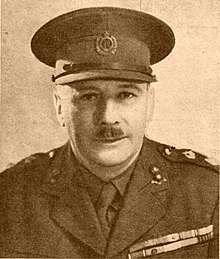Frederick Kisch
Frederick Hermann Kisch CBE, CB, DSO (23 August 1888 – 7 April 1943) was a decorated British Army officer and Zionist leader. A Brigadier, he was the highest ranking Jew to serve in the British Army.[1]
Frederick Hermann Kisch | |
|---|---|
 Brigadier Frederick Kisch | |
| Born | 23 August 1888 Darjeeling, India |
| Died | 7 April 1943 (aged 54) Wadi Akarit, French Tunisia |
| Buried | Enfidaville War Cemetery, Tunisia |
| Allegiance | |
| Service/ | |
| Years of service | 1909–1919, 1939-1943 |
| Rank | Brigadier |
| Unit | Royal Engineers |
| Battles/wars | First World War
|
| Awards | Commander of the Order of the British Empire Companion of the Order of the Bath Distinguished Service Order Legion of Honour, Officer (France) Croix de guerre with Palm (France) Order of Wen-Hu (China) |
Early military service
Frederick Kisch was born to a British-Jewish family in the town of Darjeeling, India on 23 August 1888, where his father Michael was head of the Indian Postal Service.[1] After some time, Kisch family moved back to England, where Frederick attended the Clifton College and subsequently the Royal Military Academy Sandhurst. He joined the Royal Engineers in 1909 and served with them in World War I in France and the Middle East theatres.[1]
During his war service, he was wounded three times,[1] and decorated with Distinguished Service Order for gallantry in action. He was also decorated by the government of France with the Croix de guerre with Palm. Due to his wounds, he was declared temporarily unfit for frontline service and was subsequently transferred to the Military Intelligence Corps, where he served for the rest of the war. He also served as general staff officer to General Sir George Macdonogh. During the war, he reached the rank of lieutenant colonel.
He was appointed a member of the British delegation to the 1919 Paris Peace Conference.
Interwar period
He joined the Zionist Organization in 1922, where he headed the political department until being succeeded by Chaim Arlosoroff.[1] He also served as Zionist Commission head for the Jerusalem region between 1923 and 1931. His British military background allowed him to cultivate excellent relations with the British administration of Mandatory Palestine as well as Arab leaders including Sharif Hussein of Mecca and his son King Abdullah I of Jordan. Kisch was awarded the Order of Wen-Hu (4th Class) by the Republic of China in 1921.[2]
World War II
Kisch was recalled to active service in 1939 at the outbreak of the World War II. He was promoted to the rank of brigadier and assigned to the British Eighth Army, where he became commanding officer of the Royal Engineers in the North African Campaign.[1]
Kisch was killed in Tunisia on 7 April 1943 when he stepped on a landmine during the Battle of Wadi Akarit. He had been organising reconstruction of bridge, essential to the Allied advance. He is buried at Enfidaville War Cemetery in Tunisia.
Legacy
The Israeli moshav Kfar Kisch was named after him.
In 2015, his grandson Yoav was elected to the Knesset.
References
- Five new MKs must give up foreign citizenship Haaretz, 26 March 2015
- "Decorations Conferred". London Gazette. 22 March 1921. Retrieved 13 July 2010.
External links
| Wikimedia Commons has media related to Frederick Kisch. |